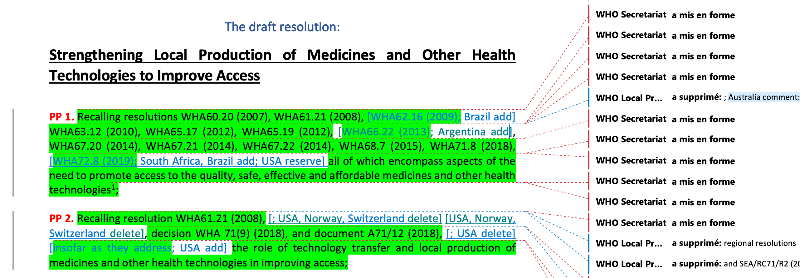How drug companies are fighting against a proposal to accept technology transfer to poor countries
This is an onsite edited excerpt of the G|O Briefing newsletter
No confinement for diplomacy when issue at stake is global access to vaccines
For the last six months or so, a draft resolution entitled “Strengthening Local Production of Medicines and Other Health Technologies to Improve Access” has been circulating among WHO’s Member States.
At stake, the speedy, fair and equitable distribution of vaccines in low-income countries. A few figures put the story into context: Roughly 10 billion doses will eventually be needed to vaccinate the world. Current production capacities are at 3.5 billion doses. So far, of the 400 million doses that have been produced, 90% of those have gone to high- and middle-income countries. And to put it simply, these wealthy countries are fighting proposals meant to help developing countries manufacture their COVID-19 vaccines. It is an enormously complex issue. But without some kind of agreement, efforts to soon see a post-pandemic world might be dramatically slowed down and possibly compromised as one part of the world, unvaccinated, would remain a threat to the other.
Obtained by The G|O, the draft resolution shows how polarized the negotiations are between the Member States. The resolution is sponsored by China and a group of African governments.
Eleven pages, complete with colored track changes, make for an illuminating read and show how developed countries are trying to prevent the transfer of technology to developing countries. It is an attempt to find alternative ways to the ongoing but deadlocked discussions at the WTO over the Trade-Related Aspects of Intellectual Property Rights, the now famous “TRIPS waiver” proposed by India and South Africa, which would de facto waive the IP rights held by the vaccines’ manufacturers.

The poorest countries are thus proposing measures to strengthen the domestic production of vaccines through technology transfer that would have the consent and agreement of the patent holders. But what might appear as a fair and sensible proposal is being hotly debated. In one paragraph of the WHO draft resolution, the proponents of the solution want to give the authority to ensure the technology transfer to the WHO’s Director-General, which would make it mandatory.
Governments such as the EU, Canada and Japan insist that such a proposal needs language indicating that any technology transfer should occur on a “voluntary” basis. Some countries have deleted the reference to “voluntary,” prompting a South African delegate to ironically point out that his government has never seen a situation where rich countries or companies are willing to give up their technology spontaneously. For the Indian government—with South Africa, the main advocate behind the TRIPS waiver discussed at the WTO—the lack of an agreement on technology transfer is one of the main reasons behind the current shortage in vaccine production.
Earlier this month, the industry shared its concern in a letter to President Biden: “Eliminating those protections,” it wrote, “would undermine the global response to the pandemic, including ongoing effort to tackle new variants and could create confusion that could potentially undermine public confidence in vaccine safety.”
Pharma has been lobbying hard against the TRIPS waiver and the transfer of technology. Knowledgeable insiders see the letter as an indication that big pharma might be worried by a potential softening of the US position. The US has always been a hardliner on IP rights. But with Joe Biden recently stressing that “we are going to make sure Americans are taken care of first, but then we’re going to try and help the rest of the world,” Washington might decide to put some pressure on the drug companies. It sees the political benefits to be gained in engaging in vaccine diplomacy, undercutting both China and Russia’s initiatives, mainly in Africa.
Other elements may eventually contribute to unlocking the current situation. Discussions are now taking place in several other fora—the Human Rights Council, and the UN General Assembly—as The G|O reported last week.Yesterday, the Human Rights Council passed a resolution, “Ensuring equitable, affordable, timely, and universal access by all countries to vaccines in response to the COVID-19 pandemic.” It requests that the UN High Commissioner for Human Rights prepare a report on the issue and creates further space for discussion at the UN Human Rights Council.
In a rare move, the agency is opening a channel with the WTO in order to mobilize a debate on access to vaccines. So far, WTO’s new D-G Dr Okonjo-Iweala–more about her below—has supported an increase in production and the transfer of technology, but won’t go as far as to support the idea by India and South Africa for a waiver on patents.
Having called the situation a “moral outrage,” the WHO D-G Dr Tedros is now proposing four paths forward:
- An increase in bilateral deals with big pharma in order to accelerate production, using sites and plants of industries that are not developing vaccines at this point in time,
- Transfer of technology, in the model established by AstraZeneca with labs in India, South Korea, or Brazil,
- The creation of a global mechanism to allow technology sharing, hosted by the WHO,
- The acceptance of a waiver for patents during the pandemic period.
The WHO resolution is due for a vote in May by the World Health Assembly.
Meanwhile, the UN Secretary-General also voiced his concerns in a virtual meeting with the African Group: “I am deeply concerned that many low-income countries have not yet received a single dose, while wealthier countries are on track to vaccinating their entire population. We see many examples of vaccine nationalism and vaccine hoarding in wealthier countries—as well as continued side deals with manufacturers that undermine access for all. The world needs to unite to produce and distribute sufficient vaccines for all, which means at least doubling manufacturing capacity around the world.”
-JC, with additional reporting from John Zarocostas and Philippe Mottaz
